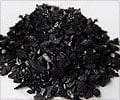Scientists at the Weizmann Institute of Science, Israel, together with colleagues from the US have successfully implemented ‘doping’ in the field of molecular electronics.
As part of their research, the scientists doped the 'clean' monolayers of carbon by irradiating the surface with UV light or weak electron beams, changing chemical bonds between the carbon atoms that make up the molecular layer. These bonds ultimately influence electronic transport through the molecules.The team succeeded in purifying the molecular layer to such an extent that the remaining impurities did not affect the system’s electrical behaviour, thereby showing that such 'contamination' is indeed possible in organic materials.
The main problem with molecular electronics is that the organic materials must first be made sufficiently pure and then, ways must be found to successfully dope these somewhat delicate systems.
Prof. David Cahen and postdoctoral fellow Dr. Oliver Seitz of the Weizmann Institute’s Material and Interfaces Department, together with Drs. Ayelet Vilan and Hagai Cohen from the Chemical Research Support Unit and Prof. Antoine Kahn from Princeton University, conducted the research.
The study appears in the Journal of the American Chemical Society (JACS).
The team believes their research might enable scientists and electronics engineers to substantially broaden the use of organic (carbon-based) monolayers in the field of nanoelectronics.
Advertisement
Source-ANI
SRM/C






